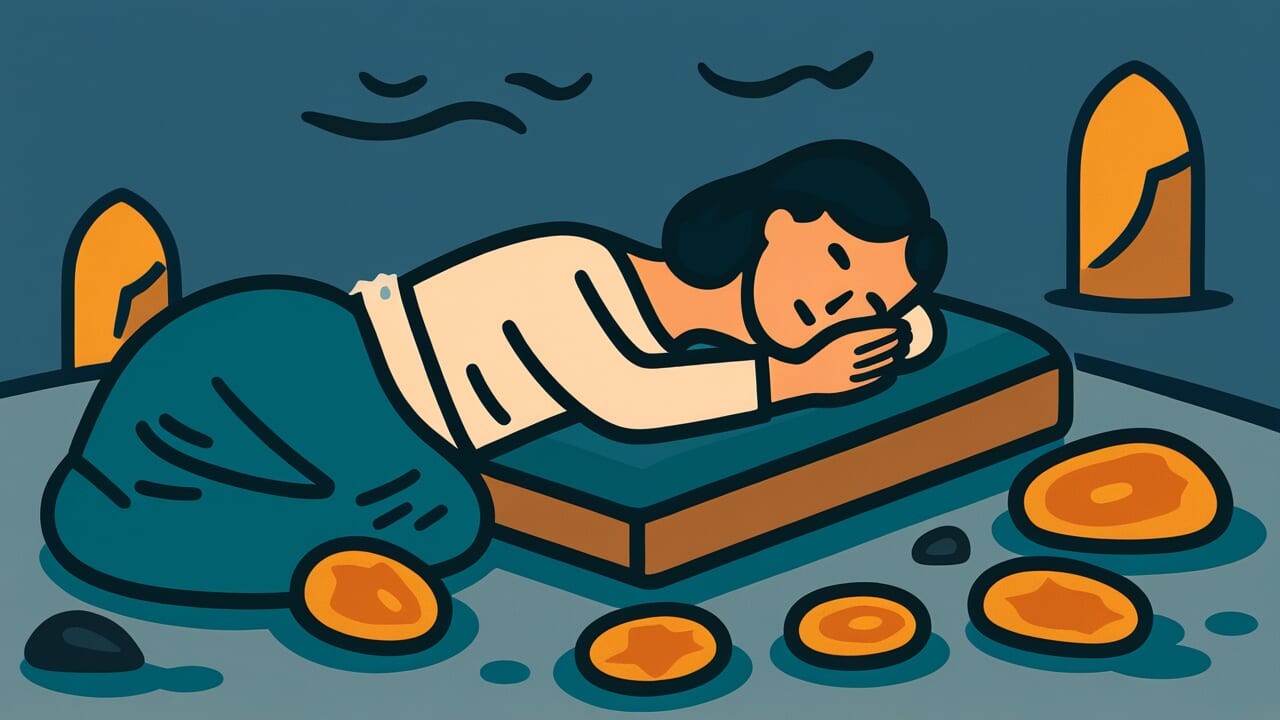How to Read “Sleeping in loses eight koku”
Asane hakkoku no son
Meaning of “Sleeping in loses eight koku”
“Sleeping in loses eight koku” means that oversleeping in the morning leads to great losses. It teaches that wasting precious morning hours ultimately results in damage you cannot recover from.
This proverb does more than just recommend waking up early. It shows the special value that morning time holds as the start of each day.
Morning is when both mind and body are most active. You can accomplish things most efficiently during this time. If you spend these hours sleeping, your productivity for the entire day drops, eventually leading to major missed opportunities.
Even today, people quote this proverb to those who cannot use morning time effectively. It is especially used when someone needs to change lazy lifestyle habits or when teaching the importance of time management.
Through the familiar act of sleeping in, this expression conveys the value of time and the importance of diligence.
Origin and Etymology
No clear written records explain the origin of this proverb. However, it likely emerged from the practical wisdom of farming communities during the Edo period.
The specific number “eight koku” refers to a unit measuring rice quantity. In the Edo period, one koku was the amount of rice one adult consumed in a year. Eight koku represented considerable value.
In terms of samurai stipends at the time, this equaled the annual income of a lower-ranking warrior.
In an era centered on agriculture, morning hours were especially precious. Waking at dawn to tend the fields led to abundant harvests.
The time when morning dew remained made weeds easier to pull. Lower temperatures meant better work efficiency. Conversely, sleeping in cut into the day’s working hours, ultimately affecting harvest yields.
By using the large number “eight koku,” the proverb emphasizes how a seemingly minor act like sleeping in accumulates into enormous losses.
One day’s delay may seem small, but over a year or several years, it could truly amount to eight koku in losses. This reflects the farmers’ lived experience.
Usage Examples
- If you keep lounging around every morning, sleeping in loses eight koku—you’ll never find time to study for your certification exam
- They say sleeping in loses eight koku, and it’s absolutely true—since I started waking up early, my work results have visibly improved
Universal Wisdom
Behind why “Sleeping in loses eight koku” has been passed down lies an understanding of fundamental human weakness. We are all beings who nearly succumb to the temptation of staying just a little longer in our warm beds.
This weakness does not belong only to modern people. Hundreds of years ago, people fought the same battle against morning drowsiness.
And our ancestors realized something important. They understood how much impact continuously giving in to this small temptation could have on an entire life.
What’s interesting is that this proverb doesn’t directly command “Don’t sleep in.” Instead, it shows the concrete loss of “eight koku.”
People in the past understood that humans are creatures who respond better to specific gains and losses than to abstract lectures.
Thinking more deeply, this proverb teaches the irreversibility of time. Lost morning hours never return, no matter how much you regret it.
You can earn back lost money, but time alone cannot be recovered.
Life is a series of choices. The small choice each morning of whether to get out of bed eventually creates major differences in life.
This proverb conveys a universal truth: daily small choices are what shape your life.
When AI Hears This
Why does losing two morning hours become a massive loss of eight koku? This isn’t something simple hourly wage calculations can explain. It’s about compound effects.
Compare someone who wakes at 7 AM and starts work with someone who wakes at 9 AM. On the first day, it’s certainly a two-hour difference.
But the results gained in those two hours change the quality of that afternoon’s work. Someone who completed important decisions in the morning can work efficiently in the afternoon too.
So the two-hour difference actually becomes a difference in the entire day’s productivity. When this continues for a year, it’s not simply 2 hours × 365 days—the gap becomes much larger.
Opportunity cost in economics means the value of alternative possibilities lost by making that choice. Sleeping in doesn’t just lose working hours.
You lose the opportunity itself to solve difficult problems or make important decisions during morning hours when your brain is sharpest.
Even more interesting is how humans tend to overvalue immediate pleasure and undervalue future benefits. For the small pleasure of 30 more minutes of sleep, they give up the large benefit of that day’s productivity.
People in the Edo period tried to change behavior by making this cognitive bias visible through the shocking number “eight koku of loss.”
Lessons for Today
What this proverb teaches us today is that life quality is determined by accumulating small daily habits. How you spend morning as the start of each day determines the direction of that entire day, and ultimately your entire life.
In modern society, night-owl lifestyles and sleep deprivation have become normal. However, what truly matters isn’t avoiding staying up late—it’s recognizing the value of morning time.
Try using the quiet morning hours toward your most important goals and dreams. The time before others start moving is precious time to face yourself.
Stopping oversleeping isn’t just a time management technique. It’s an expression of your determination to live your life proactively.
Each morning, the moment you get out of bed, you’re making the choice to “live my life carefully today.”
Start with a small step. Tomorrow morning, try waking just 15 minutes earlier than usual.
In those 15 minutes, your day—and your life—might begin to change.



Comments